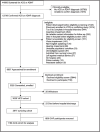Association of Social Determinants of Health With Hospital Readmission and Mortality: A Prospective Cohort Study
- PMID: 39510532
- PMCID: PMC11540449
- DOI: 10.3928/24748307-20240702-01
Association of Social Determinants of Health With Hospital Readmission and Mortality: A Prospective Cohort Study
Abstract
Background: The relative contributions of common patient-reported social determinants of health on 30- and 90-day post-discharge outcomes among patients with acute coronary syndromes (ACS) is unclear.
Objective: The aim of this article is to examine the independent associations of social determinants with readmission or death, accounting for medical history.
Methods: Participants included adults who were hospitalized with ACS at an academic medical center. Domains measured were social support, health literacy/numeracy, and socioeconomic status (SES) (including education and difficulty paying bills). We employed multivariable Cox proportional hazard models to study associations with time to all-cause readmission or death, up to 30 or 90 days after discharge, and adjusted for demographics and medical history (prior admissions and Elixhauser comorbidity index).
Key results: Among 1,168 patients with ACS and no history of heart failure, more prior admissions, and higher comorbidity index (the medical history domain) were associated with higher rates of 30- and 90-day readmission or death (domain p values <.01 and <.0001, respectively). The social support domain was not associated with outcomes. Higher health literacy and numeracy were associated with lower rates of 30- and 90-day readmission or death (domain p values .016 and .002, respectively). Higher education and less difficulty paying bills (the SES domain) was marginally associated with lower rates of 90-day readmission or death (domain, p = .052).
Conclusions: In addition to medical history, the domain of health literacy and numeracy was independently associated with readmission or death of patients with ACS during the 90 days after hospital discharge. [HLRP: Health Literacy Research and Practice. 2024;8(4):e212-e223.].
Plain language summary
Plain Language Summary In this study of patients admitted to the hospital with heart conditions, we asked them about their social support, how they understood health information (health literacy), economic status, education, and difficulty paying bills. We found that patients with higher health literacy had less returns to the hospital or died less frequently within 30 and 90 days of their initial stay.
Conflict of interest statement
Disclosure: ASM has served as a data safety and monitoring board member for the Clinical Science Research and Development Veterans Affairs Merit Grant: Personalizing Veteran Lung Cancer Screening and Diagnosis. RLR has received support for travel through the Engel Research Award from the Academy for Communication in Healthcare; and has received grants from the National Institutes of Health, Patient-Centered Outcomes Research Institute, Agency for Healthcare Research and Quality, Duke Clinical Research Institute/Novartis, Centers for Disease Control and Prevention Global Health Foundation, Centers for Medicare and Medicaid Services/Center for Medicare and Medicaid Innovation, paid to the institution. EEV has received grants from the National Heart, Lung, and Blood Institute and National Institute of Nursing Research (UG3HL165740), and the National Institutes of Health/National Institute on Aging (R01-AG065249), and served on a COVID-19 Advisory Board for Gilead Sciences. LSM has received grants from the National Institutes of Health/National Institute of Diabetes and Digestive and Kidney Diseases through the University of Utah (R01 DK124719), the Helmsley Charitable Trust (R-2203-05822), and the National Institutes of Health/National Institute of Diabetes and Digestive and Kidney Diseases (R01 DK119282 and R01 DK119282-S), paid to the institution. SPB has received grants from the National Institutes of Health/National Institute of Aging (1K23AG048347-A101), National Institutes of Health/Eunice Kennedy Shriver National Institute of Child Health and Human Development (K12-HD043483), paid to the institution. SK has received grants from the National Institutes of Health, Patient-Centered Outcomes Research Institute, Agency for Healthcare Research and Quality, Centers for Medicare and Medicaid Services, and Esperion Therapeutics, paid to the institution; and has served as a consultant to Gilead Sciences and Bayer. The remaining authors have disclosed no potential conflicts of interest, financial or otherwise.
Figures


References
-
- Aburadwan , M. K. , & Hayajneh , F. A. ( 2024. ). Health literacy among patients with acute coronary artery diseases: predictors, consequences, and enhancing strategies: A review of the literature . Critical Care Nursing Quarterly , 47 ( 1 ), 71 – 82 . 10.1097/CNQ.0000000000000492 PMID: - DOI - PubMed
-
- Adler , N. E. , Cutler , D. M. , Jonathan , J. E. , Galea , S. , Glymour , M. , Koh , H. K. , & Satcher , D . ( 2016. ). Addressing social determinants of health and health disparities . Discussion paper: Vital Directions for Health and Health Care Series. https://nam.edu/wp-content/uploads/2016/09/Addressing-Social-Determinant...
-
- Beauchamp , A. , Talevski , J. , Niebauer , J. , Gutenberg , J. , Kefalianos , E. , Mayr , B. , Sareban , M. , & Kulnik , S. T. ( 2022. ). Health literacy interventions for secondary prevention of coronary artery disease: A scoping review . Open Heart , 9 ( 1 ), e001895 . 10.1136/openhrt-2021-001895 PMID: - DOI - PMC - PubMed
-
- Berkman , L. F. , Blumenthal , J. , Burg , M. , Carney , R. M. , Catellier , D. , Cowan , M. J. , Czajkowski , S. M. , DeBusk , R. , Hosking , J. , Jaffe , A. , Kaufmann , P. G. , Mitchell , P. , Norman , J. , Powell , L. H. , Raczynski , J. M. , Schneiderman , N. , & the Enhancing Recovery in Coronary Heart Disease Patients Investigators (ENRICHD) . ( 2003. ). Effects of treating depression and low perceived social support on clinical events after myocardial infarction: The enhancing recovery in coronary heart disease patients (ENRICHD) randomized trial . Journal of the American Medical Association , 289 ( 23 ), 3106 – 3116 . 10.1001/jama.289.23.3106 PMID: - DOI - PubMed
MeSH terms
LinkOut - more resources
Full Text Sources
Medical

